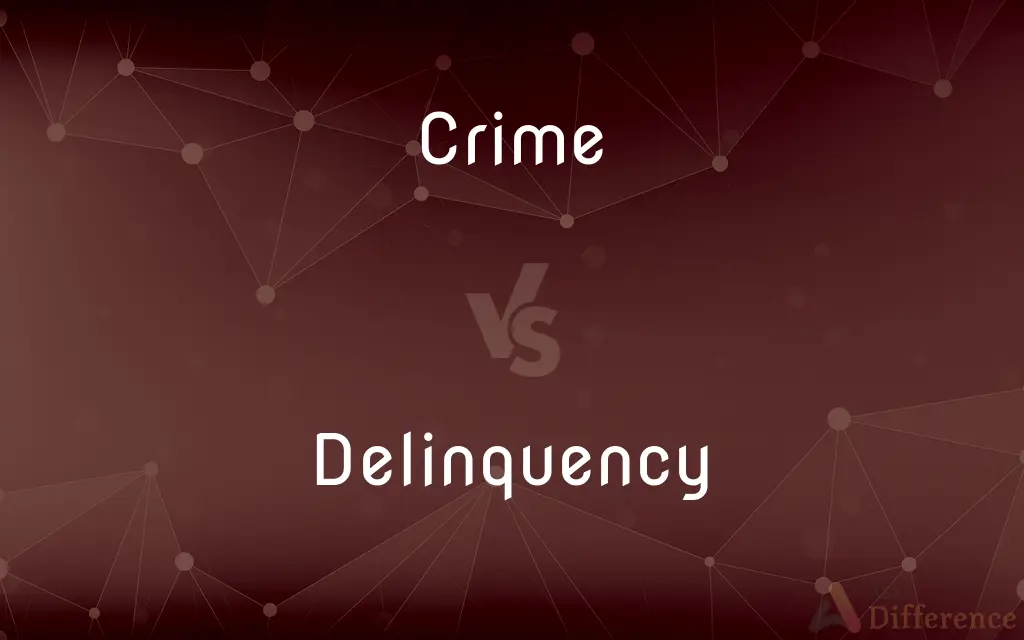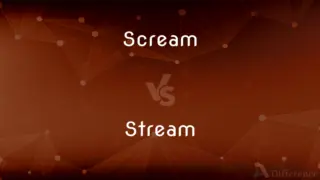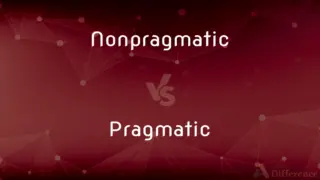Crime vs. Delinquency — What's the Difference?
By Tayyaba Rehman & Fiza Rafique — Updated on March 8, 2024
Crime involves legal infractions punishable by law for adults, focusing on the violation's severity, while delinquency refers to minor offenses or crimes committed by juveniles.

Difference Between Crime and Delinquency
Table of Contents
ADVERTISEMENT
Key Differences
Crime is a legal term referring to an action or omission that constitutes an offense punishable by law. It encompasses a wide range of offenses, from minor infractions to serious felonies. On the other hand, delinquency specifically refers to violations of the law committed by minors, which are considered less severe and are handled differently by the legal system to reflect the age and development of the offender.
While crimes can be committed by individuals of any age, the term "delinquency" is exclusively used to describe illegal acts committed by those under the age of majority, which is usually 18 in many jurisdictions. Crimes, regardless of the offender's age, can lead to arrest, trial, and incarceration. Whereas, delinquency often results in interventions focused on rehabilitation rather than punishment, recognizing the potential for change and growth in young individuals.
The legal system treats crime and delinquency differently, reflecting society's view on accountability based on age. Adults convicted of crimes face penalties designed to punish, deter, and sometimes rehabilitate. In contrast, juvenile delinquents are more often subjected to measures aiming at their education, rehabilitation, and reintegration into society, emphasizing support and guidance over retribution.
The severity and nature of the offenses categorize whether an act is considered a crime or delinquency. Serious offenses like murder, theft, or assault are classified as crimes when committed by adults. However, when such acts are perpetrated by juveniles, they may still be labeled as delinquent acts, but the approach to sentencing and rehabilitation is distinctively different, focusing on the juvenile justice system's rehabilitative ethos.
The consequences of crime and delinquency also differ significantly. Criminal convictions can lead to long-term imprisonment, fines, or other penalties, affecting an individual's life and rights. Delinquency interventions, however, often include community service, probation, or counseling, aiming to correct behavior without imposing harsh long-term consequences that could hinder a juvenile's future prospects.
ADVERTISEMENT
Comparison Chart
Definition
Legal offenses punishable by law
Minor legal offenses by juveniles
Age of Offender
Any age
Typically under 18
Legal System
Adult criminal justice system
Juvenile justice system
Objectives
Punishment, deterrence, rehabilitation
Rehabilitation, reintegration
Consequences
Arrest, trial, incarceration
Interventions, probation, community service
Compare with Definitions
Crime
Prosecuted in adult courts.
A burglary charge results in a trial in criminal court.
Delinquency
Focuses on rehabilitation.
A delinquent might be assigned to a youth correctional program.
Crime
A legal violation punishable by law.
Stealing a car is considered a crime.
Delinquency
Minor offenses by juveniles.
Vandalism by a teenager is considered delinquency.
Crime
Includes felonies and misdemeanors.
Assault is a crime that may be categorized as a felony.
Delinquency
Can involve community service.
Graffiti tagging may result in a delinquent performing community cleanup.
Crime
Affects individuals of any age.
Both teenagers and adults can be charged with drug offenses.
Delinquency
Handled by juvenile courts.
Cases of shoplifting by minors are often resolved in juvenile court.
Crime
Can result in serious penalties.
Committing fraud can lead to imprisonment.
Delinquency
Aims to reintegrate youths.
After probation, delinquents often receive support to return to school.
Crime
In ordinary language, a crime is an unlawful act punishable by a state or other authority. The term crime does not, in modern criminal law, have any simple and universally accepted definition, though statutory definitions have been provided for certain purposes.
Delinquency
Juvenile delinquency.
Crime
An act committed in violation of law where the consequence of conviction by a court is punishment, especially where the punishment is a serious one such as imprisonment.
Delinquency
Failure to do what law or duty requires.
Crime
Unlawful activity
Statistics relating to violent crime.
Delinquency
An offense or misdemeanor; a misdeed.
Crime
A serious offense, especially one in violation of morality.
Delinquency
A debt or other financial obligation on which payment is overdue.
Crime
An unjust, senseless, or disgraceful act or condition
It's a crime to waste all that paper.
Delinquency
Of or relating to juvenile delinquency
Delinquency problems.
Crime
(countable) A specific act committed in violation of the law.
Delinquency
Misconduct.
Crime
(countable) Any great sin or wickedness; iniquity.
Delinquency
A criminal offense.
Crime
That which occasions crime.
Delinquency
A debt that is overdue for payment.
Crime
(uncountable) Criminal acts collectively.
Delinquency
Failure or omission of duty; a fault; a misdeed; an offense; a misdemeanor; a crime.
The delinquencies of the little commonwealth would be represented in the most glaring colors.
Crime
(uncountable) The habit or practice of committing crimes.
Crime doesn’t pay.
Delinquency
Nonpayment of a debt when due
Crime
To subject to disciplinary punishment.
Delinquency
A tendency to be negligent and uncaring;
He inherited his delinquency from his father
His derelictions were not really intended as crimes
His adolescent protest consisted of willful neglect of all his responsibilities
Crime
(nonce word) To commit crime.
Delinquency
An antisocial misdeed in violation of the law by a minor
Crime
Any violation of law, either divine or human; an omission of a duty commanded, or the commission of an act forbidden by law.
Crime
Gross violation of human law, in distinction from a misdemeanor or trespass, or other slight offense. Hence, also, any aggravated offense against morality or the public welfare; any outrage or great wrong.
Crime
Any great wickedness or sin; iniquity.
No crime was thine, if 'tis no crime to love.
Crime
That which occasion crime.
The tree of life, the crime of our first father's fall.
Crime
(criminal law) an act punishable by law; usually considered an evil act;
A long record of crimes
Crime
An evil act not necessarily punishable by law;
Crimes of the heart
Common Curiosities
Are juveniles ever tried as adults for serious offenses?
Yes, in cases of severe offenses, juveniles can be tried as adults, facing similar consequences as adult offenders.
Can the same act be a crime and delinquency?
Yes, the classification depends on the age of the offender; acts by juveniles are considered delinquency, while the same acts by adults are crimes.
How are the consequences of delinquency designed to affect juveniles?
They are intended to correct behavior without harsh long-term impacts, focusing on rehabilitation and future well-being.
What distinguishes a crime from delinquency?
Crimes are serious legal offenses punishable by law for any age, while delinquency refers to minor offenses or crimes committed by juveniles.
What's the purpose of treating delinquency differently from crime?
The aim is to rehabilitate juveniles, recognizing their potential for change and growth, and to reintegrate them into society positively.
Is there a difference in the rights of individuals in crime vs. delinquency cases?
Yes, juveniles have certain rights within the juvenile justice system, focusing on protection and rehabilitation, different from adults' rights in criminal cases.
How does society benefit from treating delinquency differently?
It allows for the correction of behavior in a developmental stage, potentially reducing future crime rates by addressing issues early.
Can a person's delinquent history affect them in adulthood?
Depending on the jurisdiction, juvenile records may be sealed or expunged, minimizing impact on future opportunities.
How do educational programs play a role in addressing delinquency?
Educational and vocational training programs are often part of rehabilitation to equip juveniles with skills for a positive future.
How does the legal system treat crimes differently from delinquencies?
Crimes can lead to imprisonment and fines, focusing on punishment and deterrence, whereas delinquencies often result in rehabilitation-focused interventions.
Can delinquency lead to harsher penalties if repeated?
Yes, repeat offenses can result in more severe interventions, including detention in juvenile facilities.
What impact does community service have on juveniles?
It aims to instill a sense of responsibility and community connection, helping correct behavior through constructive activities.
What role do parents play in a juvenile delinquency case?
Parents may be involved in the rehabilitation process, attending counseling or providing support as part of the intervention.
What types of crimes are most commonly associated with delinquency?
Common delinquent acts include vandalism, shoplifting, underage drinking, and truancy.
Can delinquency interventions include mental health support?
Yes, counseling and mental health services are common components, addressing underlying issues contributing to delinquent behavior.
Share Your Discovery

Previous Comparison
Scream vs. Stream
Next Comparison
Nonpragmatic vs. PragmaticAuthor Spotlight
Written by
Tayyaba RehmanTayyaba Rehman is a distinguished writer, currently serving as a primary contributor to askdifference.com. As a researcher in semantics and etymology, Tayyaba's passion for the complexity of languages and their distinctions has found a perfect home on the platform. Tayyaba delves into the intricacies of language, distinguishing between commonly confused words and phrases, thereby providing clarity for readers worldwide.
Co-written by
Fiza RafiqueFiza Rafique is a skilled content writer at AskDifference.com, where she meticulously refines and enhances written pieces. Drawing from her vast editorial expertise, Fiza ensures clarity, accuracy, and precision in every article. Passionate about language, she continually seeks to elevate the quality of content for readers worldwide.















































